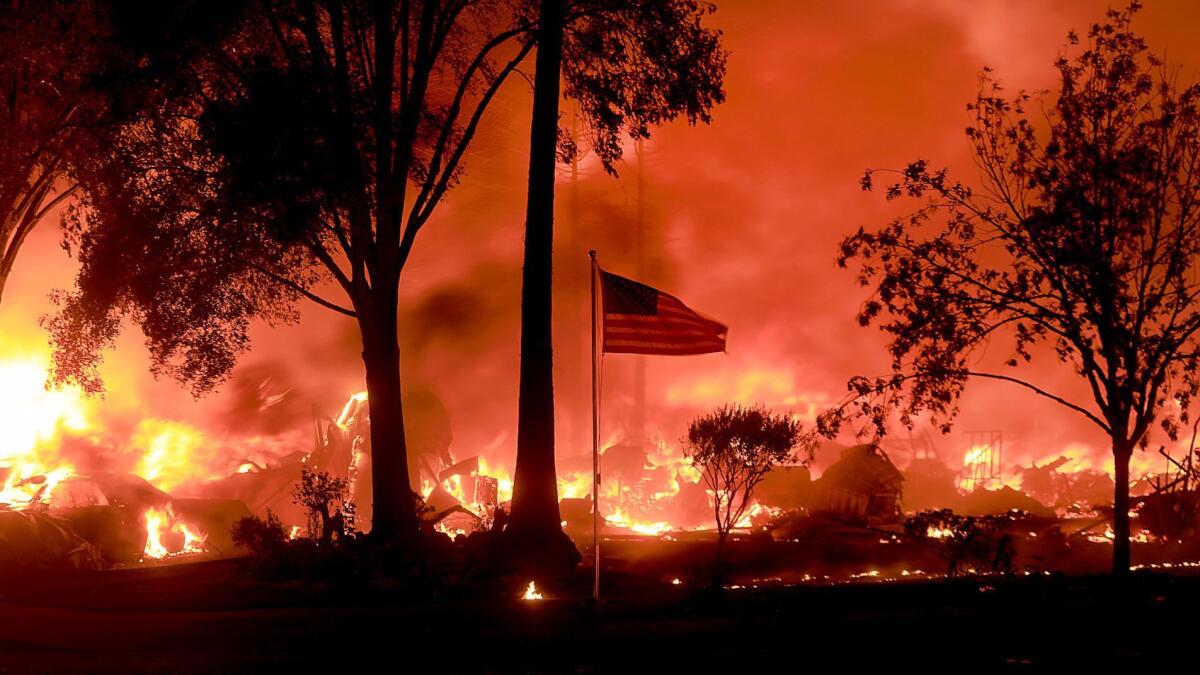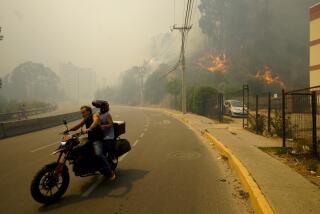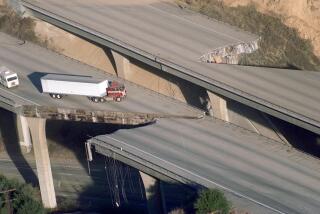Opinion: What natural disaster can teach us

A friend living in St. Thomas recently marked herself “safe” on Facebook for the second time in two weeks. She was safe in only the most critical and cursory sense, which is to say she was alive. Her home and her business had been reduced to rubble.
Puerto Rico has been destroyed by hurricanes. Last month, hundreds died in Mexican earthquakes. Hurricane Irma hit the U.S. Virgin Islands and the Florida Keys, and laid waste to Barbuda. Harvey devastated parts of Texas. Fifteen separate fires have turned thousands of Northern California homes and businesses to dust and smoked out neighboring cities. Aerial video from that area recalls nothing as much as the transformation of “Mad Max: Fury Road’s” Green Place, a once-verdant landscape that becomes brown and barren, circled by crows. Closer to us, the Anaheim Hills fire has laid waste to nearly 6,000 acres. That number will be higher tomorrow.
And about tomorrow: what might it bring? A swarm of locusts?
Disaster, if we let it, can teach us that we who have not yet suffered are not untouchable; we are not special; we are lucky. And luck runs out.
When a fellow Angeleno friend texted me about buying an emergency kit after the earthquakes in Mexico, I finally pored through the options. “Select one that doesn’t scream survival kit,” he wrote. “If a natural or man-made disaster happened, you wouldn’t want your bag targeted to be stolen.” What he was describing was a post-apocalyptic nightmare scenario; it was also all too reasonable to ignore.
My friend referred to “natural” or “man-made” disasters as distinct phenomena. Certainly, “natural” disasters (earthquakes, floods, wildfires) and “man-made” disasters (human violence) long preceded the industrial revolution. But climate change — which is not a matter of opinion or of faith, but of science — aggravates all disasters. It merges the two categories. “After more than a decade of drought, the fuel levels up and down California (dry brush and grasses) are exceptionally high,” climatologist Bill Pazert told the Los Angeles Times. “The conditions are primed for fire.” NASA research finds that “changes in climate not only affect average temperatures, but also extreme temperatures, increasing the likelihood of weather-related natural disasters.”
Unprecedented hurricanes and wildfires are not simply the hand of God or nature — they are also the hand of man and his machines, which create conditions in which such natural disasters can spark and spread. Meanwhile, wars are often fought over or aggravated by a scarcity of natural resources. “Natural” and “man-made” are now more like a Venn diagram than two separate circles which orbit each other. There is little comfort or clarity to be found in this knit space; the feeling is closer to dread.
A 2016 Yale poll showed that 58% of Americans believed that global warming would harm people in the U.S., but only 40% believed it would harm “me personally.” It’s too early to know if the maelstrom of natural disasters in the Americas has shifted public opinion. It has not changed the opinion of our president, who has called climate change a “hoax” and backed out of the Paris climate agreement. It has not changed the opinion of our Environmental Protection Agency chief Scott Pruitt, who on Monday announced a move to repeal an Obama-era rule that would curb greenhouse gas emissions from power plants.
I find thinking I can make an impact to be increasingly difficult. I recycle and conserve energy. I’ve made a few small donations to various recovery efforts. I call my representatives, sign petitions, show up to rallies. It feels like nothing; it’s damn close.
But if we tire of fighting, the most vulnerable suffer doubly. The poorest communities and nations are hit hardest by climate change because they can least afford the adaptation schemes — air conditioning (the use of which, of course, contributes to more global warming) or property insurance. They often don’t have the resources to evacuate.
Our best hope may be to stay kind to ourselves and others, to acknowledge that we will fray and break a little easier, to hold those afflicted by catastrophe in our thoughts and not turn away from them, to give of ourselves how we can, to lobby for greater environmental protection, to remember that — as much as our minds might want to deny it — we too will need help. Climate change will harm us personally; it will harm our successors, those we love; that person on the news today, covered in rubble or wading through water, may well be us tomorrow. It’s a mean truth, but there’s compassion to be gleaned from it. Disaster, if we let it, can teach us that we who have not yet suffered are not untouchable; we are not special; we are lucky. And luck runs out.
Melissa Batchelor Warnke is a contributing writer to Opinion. Follow her on Twitter @velvetmelvis.
More to Read
A cure for the common opinion
Get thought-provoking perspectives with our weekly newsletter.
You may occasionally receive promotional content from the Los Angeles Times.







